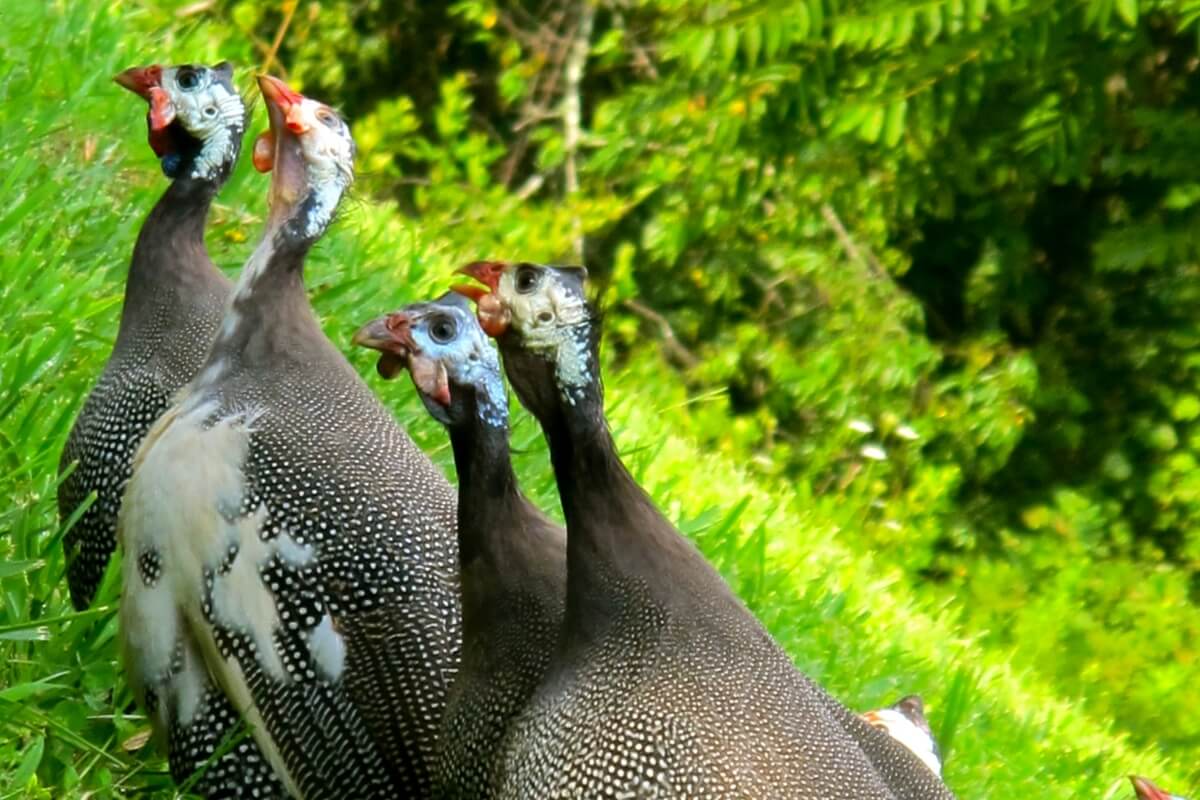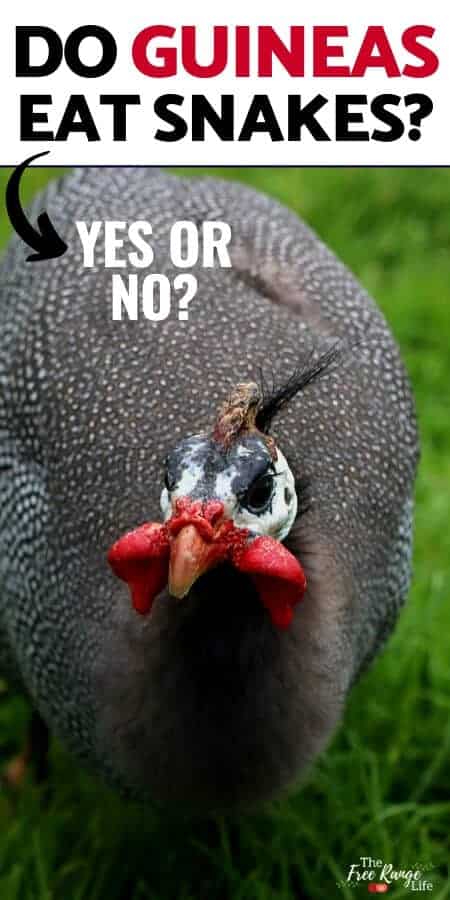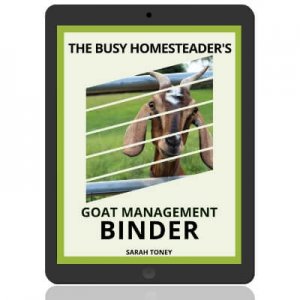It’s the number one question when it comes to guinea fowl. I get asked over and over again.
This site contains affiliate links. If you make a purchase using one of these links, I may earn a commission. Please see my disclosure page for more information about cookies collected and our privacy policy.
Do Guineas Really Eat Snakes?
Guineas are touted as being great for pest control. And not just insects, but small rodents and yes, even snakes.
Maybe you read my article on 5 Reasons NOT to Own Guineas and are still weighing the pros and cons.
And you want to know… Is it true? If you get a flock of guineas will they eat the snakes on your property?
The Answer? A disappointing….
Maybe
Here’s what I, and the homesteading community, can tell you for sure about guineas and snakes:
A flock of guineas will disrupt the snake’s habitat and deter them from coming around. Snakes like it calm and quiet. Guineas are neither.
Guineas will notice a snake, but more often than not the flock, especially if it’s a young flock, will just surround the snake and “discuss” it, inspect it, but not eat it.
The smaller the snake the more likely your guineas will be to eat it. A smaller snake appears more like a large worm and they will peck at it. Chickens will do the same.
You can train your guineas to eat snakes. I don’t have any experience with this, but if you have a nice trainable flock. Give it a shot!
Similar to cats, your guineas might play with the snakes they find. They may give them a peck or two, maybe chase them a bit. But probably not peck it to death. Though if its not killed, the snake will probably move on its way after an encounter with guineas.
Guineas don’t have the greatest of survival instincts. So, you might have trouble keeping them around long enough to actually eat any snakes.
The bottom line.
If you have a snake problem, guineas could be your answer. So could a good flock of chickens or turkeys. Or a good cat. Our barn cats love snakes.
So keep weighing the pros and cons on adding guineas to your homestead. And read up on how to raise guineas for beginners. Of course, if you get them and they don’t work out, you can always butcher them for the freezer!





I found you through Chicken Chick’s Bloghop – I hope you’ll have a moment to visit my blog, & if you do I hope you’ll let me know you’ve stopped by.
I have been considering guineas for a while now, and your articles are quite helpful, as well as funny (I also found some of your links on Pinterest & I can imagine the din of these birds!). I’m not sure my dog wouldn’t kill them, which is my major stumbling block, but I would sure like to have birds eating up the millions of ticks in this wretched part of bush country.
I have a dog that is highly untrained. Guineas havent been a problem with them. The get chased once, they stay away. However, our dog is on a run and doesnt have full access to our livestock
I had a small flock of guineas that started yelling whenever a large bird flew over the farm. After awhile they started yelling whenever they saw an airplane fly over. (Similar shape as bird.) Eventually they started yelling whenever they HEARD an airplane!
I found you comment funny. I acquired a dog who barked and tried to chase the planes as well as the birds. Now all my ranch dogs do this. Thankfully, I do not live near an airport.
our neighbours recently acquired a half dozen guinea fowl, it is true they have not attacked the mulch in our garden like their totally free range chickens have, they seem to have formed a barrier between our place and the wandering chickens, time will tell! Absolute FACT, they are really noisy, and when they discover something they want to share, nothing else can be heard above their raucous screeching clamour, UGGH!
I’m finding your comments not only accurate, but humorous as well. We added 6 Guineas to our homestead about a month or 6 weeks ago. I had thought our geese were loud. We have two breeding pair. But the geese are quiet compared to the Guineas. I live them!
About a week after we got them, they got out of the in closure I had put them in. Not only a fenced yard, but a net roof to keep tame birds in and wild birds out.
I called them, threw treats… Nothing got them back. I couldn’t see where they had gotten out.
OK my birds are gone. The next morning, ALL 6 we’re back in the fence looking at me asking for breakfast. I still don’t know how they got out. I put netting around and over the entire inclosure. I believe they are related to Harry Houdini.
To answer the question do guineas eat snakes? I witnessed my flock of 16 eating a 3 foot diamondback rattlesnake.
I will be living in a remote area in Costa Rica where there are a lot of deadly Terciopelo (Fer de Lance) snakes. They are the most dangerous snake in all of Costa Rica and if you get bit, you don’t have long to live, if you can’t get to a doctor fast. Since the nearest doctor is about an hour away, it’s important to find something that will discourage snakes from coming around. If there is any other better animal than a guinea fowl for this purpose, I would like to know what it might be. cats and dogs are not the answer, as the snakes will kill them. I’ve heard a flock of geese might kill a bad snake, as they band together to get the job done.
My gaggle of 10 geese variety of breeds are scared of my dogs and just about everything else. Now the Pilgrams seem to be more courageous at times, they usually all just run away if something scares them. They’re only good for letting me know there’s an arial predator around.
Even if guinea fowl eat snakes, it is also hunted by one species of snakes, like Gaboon Vipers.
Why do people immediately think of killing something to get rid of it?
If you want to keep snakes away, put things up that make lots of vibrations through the air and ground. Radio, windchimes, etc. If they feel these, they most likely will choose to not pass through.
BUT snakes are very good at getting rid of the mouse population, and it’s not like they do any harm to anything. Yes, some will eat chicks and eggs, but only if you free range your birds. We’ve never once had an issue with snakes, and they’ve been here for years. We do not free range our birds, and we do not have issues with the fox, weasels, hawks, etc, all of which we see on a regular basis, and all of which bother our neighbor’s free ranged birds. Free ranging is essentially like waving a sign saying, “FREE MEAL! COME GET YOUR FREE MEAL!” You’re asking for something to get your birds if they are free ranged. Don’t free range them and you probably won’t have an issue. I can’t stand it when someone will post about their dead bird that was killed by car/fox/hawk/other, and then say something like, “Mrs. Hen was killed today by the hawk. She’s the fifth bird that became its meal.” The fifth?? They should have learned by the second bird to die that there’s a problem on THEIR part.
Some snakes are venomous, obviously, but more snakes would be willing to take off in the opposite direction when they see a human, or large animal, than try to attack. In terms of survival, that makes little sense.
AND snakes hurt their teeth whenever they bite, so biting isn’t their first line of defense, which is to hide, or leave. It’s usually only when someone provokes them that they bite. Leave them alone and they shouldn’t bother anyone.
Also, Tabra, if a venomous snake bit a guinea, it would kill those as well. “I WILL be living in a remote area of Costa Rica where there are a lot of deadly snakes.” Why? Why would you choose to live in an area where you know full well that there are venomous species living there? Why would you try to bring something in to kill them, disrupting their native home, when YOU are the one making the choice to move there? Unless there’s an actual good reason for it, that is a very peculiar decision, especially since, in this remote area, there is no hospital nearby.
We do not have venomous species of anything where we live, thankfully. But we have cougars, bears, wolverines, lynx, bobcats, and packs of coyotes where we are, all of which can be dangerous and deadly. We’ve never once had an issue with any of these, even though we see most of those on a fairly regular basis. When we do not see them, we know they are there nonetheless. We do not rely on any chemicals or guns or anything to try to ward or kill them off. We have birds, horses (including miniatures), sheep, and goats, and not once have we had an issue with them attacking anything. There is a mutual respect, that if we do not bother them, they will not bother us, and as for our animals, they are in a protective fence. A cougar or bear could get through if one wanted, but they don’t. They have other food sources that are easier to get. We have also put up windchimes, and if those are what ward them off, they are doing a fine job.
Please don’t disrupt a natural ecosystem just because you’ll be there. If you can, refrain from moving to that specific location. Or, as I said above, put things around that make lots of noise, which in turn will vibrate through the air and ground, and will discourage snakes and other animals. Ask the locals about how they discourage them. Some will rely on chemicals, which should never be recommended, some will kill them with a gun, which should also never be recommended, and others will rely on natural solutions.
Some plants may also ward off snakes and other animals. I know apple mint wards off rodents, which for many snakes, this is there main food source, so if you ward off their prey, the snakes will follow the rodents. I don’t know about that specific species of snake, and I don’t know if apple mint wards off anything other than rodents, but there are natural options. Just research them.
Sensible reply, more should take heed of your common sense.
Snakes are deaf … forget the wind chimes. You don’t have venomous snakes where you live? Then din’t preach to those of us who do.
Copper heads, Cotten mouth, rattle snakes, this is what I have on my place… and a 2 & 5 year old kids, yes I think I will be free range some birds to get them away
I suspect that she has never been in a field with numerous rattle snakes. You hear them all around you and it is next to impossible to see many of them. You sort of have to freeze and pick your way out very slowly and study the heck out of your escape path. People that work on power lines often need to enter such fields. I sat down to eat my lunch one day and a coral snake was crawling across my boot. Not all areas are the same at all.
Snakes aren’t really deaf. They feel vibrations. If they were really deaf, they wouldn’t make it, would they.
Wow! Very passionate about snakes I see. You make a lot of points. After reading this I have decided that I will still kill every snake I see, even when it means me swerving to the other side of the road to slam on my brakes and skid the snake. Thanks for the thought though!
BEST COMMENT EVER! LOL ALL snakes must DIE!
Nope, snakes are stupid…. Lost a dog last year and I stepped off my deck on my to get bit from him underneath the stairs…. I’ll spray every chemical, shoot with my shotgun, and if they birds do it get a flock of 30…. Until you see your neighbors lose a child/ you lose a pet after 9 years/ and almost die from walking outside not even in “their area” I don’t want to here she*t about the ecosystem…. Burn/ kill them all…. I live in Texas.
Most of us who have poultry want to put them into a more natural habitat, which would be free ranging for bugs and grasses. Only a person who has too much time on their hands would: lock them up; feed them only grains rather than have them foraging for their own food; and spend numerous hours each week cleaning out their cages. Chickens are smart; they hear a hawk coming and they hide. Yes, hawks occasionally get one, but I’d rather contribute to the circle of life than keep my chickens permanently penned.
Please try telling a friend of mine who’s two sons and dog were all bit by copper heads last year that she should not kill the copper heads! They did not provoke the snakes they simply walked out the front door and had bad luck. Today she found one in her garden and her husband was struck at. They were both lucky to not be bit. When any animal threatens the safety of your family its okay to take extreme measures.
I totally agree with you Rachel.
Jean,
your personal answer to my questions from a few days ago, about Terciopelos is interesting. However, I’m looking to find solutions to a real problem. Perhaps you might want to check out how aggresive the Terciopelo is.
I have chosen to live/retire in Costa Rica because they don’t have a milltary and aren’t into killing people from other countries. I like the Costa Rican people and it is an incredibly beautiful and friendly country.
I choose to live in beautiful Costa Rica along with thousands of others who live in the country because they love nature and growing their own organic food.
I asked the natives in the area what they do to keep from getting killed by a snake. Most of them try to chop the heads off of Terciopelos as they are agresssive and jump high. There are no clinics presently in the area so the locals are afraid. (You might want to look up what happens when you get bit by a terciopelo and don’t get to a doctor fast enough.) We are working with a group to get a clinic built as soon as possible so that we all have access to the antivenom.
For me, I am hoping to let nature take her course and let guinea fowl eat them for dinner. Although I am a vegetarian, the Guinea Fowl is not and has to eat something. The Guinea Fowl is a beautiful bird, but noisy according to an ex-pat friend I just talked to a couple of days ago, who has a number of them on his finca and he says they are working out fine for him. He gets to work in his fields and feel safe and his pet Guinea Fowls get to enjoy themselves. He has grown accustomed to their noise. He said you don’t have to get too many.
So yes of course, ask the natives in the area who work in the fields. the ones I have asked, recommend chopping the heads off of Terciopelos immediately.
I think I prefer the Guinea Fowl – but who knows. I haven’t got any yet.
We have Guineas in our yard. We have raised them from babies. They stay around the chicken pens even though they can roam free. They keep everything away from the chicken pens. We have 5 and they roost on top of the chicken pen. We do have netting on the top of the pens. But for us Gunieas are the way to go. We watched one of the Gunieas knock an hawk as he flew down to get one of our rabbits. He hawk finally flew away and we haven’t seen him again because the Gunieas kept attacking the hawk. Our Gunieas are very spoiled and get treats for doing such a good job. Raise them from babies and they will not leave your yard.
Hi Tabra
I’m from Costa Rica living in the states, however I’ll be moving back to Costa Rica next year to a place called Guapiles, you might heard of this place heading to Limon. As you may know by now there’s a lot of terciopelo and matabuey snakes in that region. So perhaps I can contact you to see if you can give me the information where I can buy this guinea birds for my finca if you don’t mind. Mrs. Tabra thank you in advance.
Hi Luis, I know where Guapiles is. I buy a lot of trees there to plant on my property! Yes, there are a lot of bad snakes in the Limon area, but I do love the Caribbean side of Costa Rica so much. I will live on the Banana River. I have no idea where to get the Guinea Fowl. I just know I’m going to need some. You’re right – there are very bad snakes, but that’s true in a lot of Costa Rica – except in the cities. I prefer the country side…
what about small dogs like the Rat Terrier or the Jack Russel
I would never buy a pet like a dog specifically to kill snakes, but I have had good luck with several different Catahoula dogs. Childhood dogs in Louisiana were always killing water moccasins, so I brought a puppy to Colorado with me and she grew up to kill rattlers any near my house. They are fast, agile, and protective of their homes. However, they are still pets and I am not sure they could manage an overwhelming number of snakes at once.